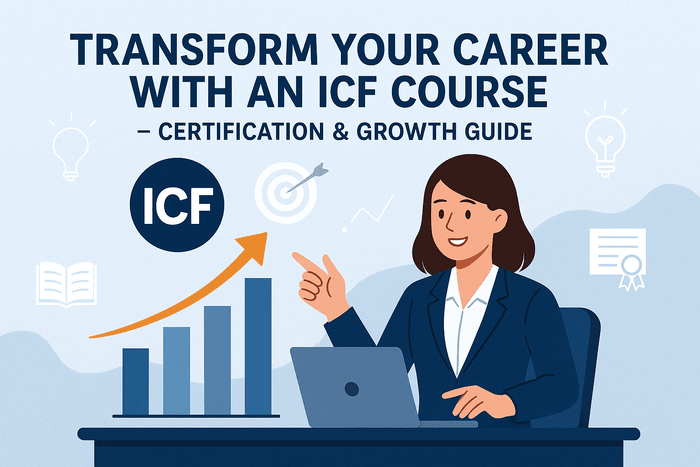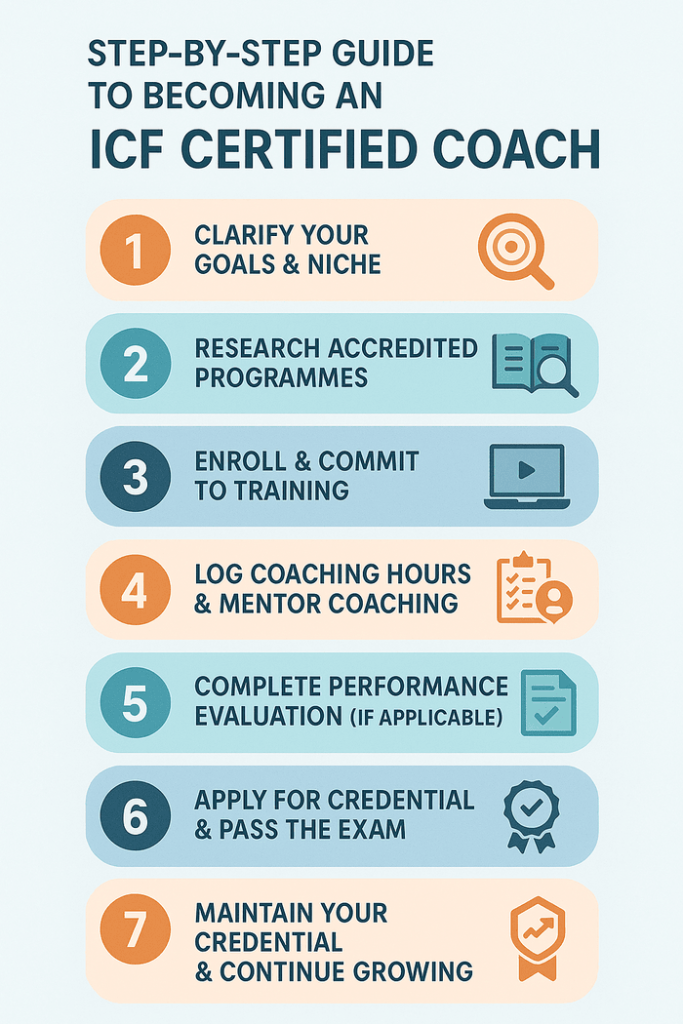
India’s economy has transformed dramatically over the last decade, and the demand for top business coach India services has grown...
Are you ready to reinvent your career and make a lasting impact? The International Coaching Federation (ICF) offers globally recognised courses that empower professionals to become confident, credentialed coaches. An ICF course not only teaches you the skills to guide clients toward their goals—it also equips you with credibility, ethical grounding and a supportive network. Whether you want to transition into coaching full‑time, enhance your leadership abilities or add a valuable credential to your résumé, this guide shows how an ICF course can transform your career.
In the following sections, we unpack the benefits of ICF accreditation, explore different course types and provide a practical roadmap for becoming certified. Along the way, we’ll reference successful coaches and highlight how the ICF ecosystem fosters growth, ensuring you receive an education that meets high global standards.

The International Coaching Federation is the world’s largest professional body for coaches, known for setting rigorous standards and providing ethical guidelines. ICF accreditation signals to clients and organisations that a coach has met stringent training and competency requirements. As the Coach Transformation Academy’s site notes, programs accredited by the ICF ensure that trainees learn at high standards and follow recognised coaching competencies.
Understanding the ICF’s role prepares you to appreciate the value of accreditation and sets the context for why choosing an ICF course is a strategic career move.
Being certified by the ICF provides evidence that you have completed high‑quality training, mastered the core competencies and commit to ethical behaviour. Clients seeking coaching services often look for certifications to ensure they’re working with qualified professionals. As noted on CTA’s page, their ICF‑accredited programmes follow recognised coaching competencies and are trusted across the globe.
An ICF course can unlock diverse career paths:
With more people entering the coaching profession, certification helps you stand out. ICF‑accredited coaches often command higher fees because clients trust the rigorous training and ethical standards behind the credential. In corporate settings, an ICF credential can lead to promotions or new roles focused on leadership development.
An ICF course isn’t just about professional advancement—it fosters personal transformation. Many coaches report improved self‑awareness, empathy and communication skills. Guiding clients through growth journeys can be deeply rewarding and aligns your career with your purpose.
ICF courses emphasise the Core Competencies: active listening, powerful questioning, creating awareness, designing actions, planning and goal setting, managing progress and accountability. These competencies are applicable across industries and leadership roles. As you master them, you become adept at facilitating change, building rapport and inspiring others.
ICF programmes integrate practical coaching sessions where trainees coach peers or clients under supervision. This hands‑on practice builds confidence and competence. Training providers like CTA emphasise experiential learning, allowing students to apply concepts immediately.
Through your ICF course, you’ll connect with fellow coaches, instructors and mentors. Many programmes include mentor coaching, where experienced coaches provide feedback and guidance. This network can lead to future collaborations, referrals and support as you build your business or progress within your organisation.
Consider Aisha, an HR manager who felt limited in her role. After completing a Level 1 ICF course, she integrated coaching into performance reviews, improved team communication and was promoted to leadership development manager. Ben, a marketing professional, pivoted to become a life coach. His ICF credential helped him attract clients quickly and establish an international coaching practice. Stories like these underscore how ICF courses unlock new opportunities.
ICF courses vary by depth, duration and credential outcomes. Here’s a comparison of common programmes:
Course Type | Credential Path | Training Hours | Key Features | Ideal for |
Level 1 (ACC Path) | Associate Certified Coach (ACC) | 60+ hours | Fundamental coaching skills, introduction to ethics, mentor coaching (optional). | New coaches exploring the profession; professionals adding coaching to existing roles. |
Level 2 (PCC Path) | Professional Certified Coach (PCC) | 125+ hours | Advanced coaching competencies, mandatory mentor coaching, performance evaluation. | Coaches seeking deeper practice and higher credential; leadership professionals. |
Transformational Coaching Certification | Varies (Level 1 or Level 2) | 80–150 hours | Integrative approach combining coaching, neuroscience and personal development; often includes group coaching practicums. | Professionals seeking profound personal growth and tools for transformative change. |
When comparing programmes, consider factors like delivery method (online vs. in‑person), schedule flexibility, mentor support and cost. Many providers offer payment plans or early‑bird discounts.

Becoming an ICF certified coach involves several deliberate steps. Use the checklist below to navigate your journey.
Before enrolling, reflect on why you want to become a coach. Do you aim to specialise in executive coaching, wellness, career transitions or personal growth? Clarifying your niche helps you select the most suitable programme and align your marketing later.
Consult the ICF Education Search Service to find accredited courses. Examine course curricula, faculty credentials, formats, costs and mentor coaching options. Reach out to programme advisors to ask questions and request informational interviews with graduates.
Choose a start date and enrol. Commit to completing the required training hours, including live sessions, self‑study and practical coaching. Actively participate in class discussions and practicum sessions to maximise learning.
Start coaching clients early—some programmes encourage you to coach peers or volunteer clients during training. Track your hours meticulously. Schedule mentor coaching sessions across at least three months to meet ICF requirements and receive constructive feedback.
Depending on your course level, you may need to submit a recording and transcript of a coaching session for evaluation. Select a session that showcases your ability to apply core competencies. Seek feedback from your mentor before submission.
Gather all documentation (training certificate, coaching log, mentor coaching proof). Apply via the ICF credentialing portal, pay the fee and schedule the ICF Credentialing Exam. Review exam resources, practise with sample questions and arrive prepared.
Upon certification, plan your continuing coach education (CCE). ICF requires ongoing learning to renew your credential every three years. Attend workshops, webinars or advanced courses to refine skills and stay current. Consider progressing to Level 2 or exploring specialisations.
Not all programmes are equal. To help you decide, here’s a simplified comparison of three fictional providers inspired by real offerings:
Provider | Accreditation & Credential Path | Delivery | Duration | Cost (USD) | Notable Features |
Global Coach Academy | Level 1 (ACC) | Live online + self‑study | 3 months | $3,200 | Small cohorts, mentor coaching included, business development modules. |
Leadership Coaching Institute | Level 2 (PCC) | Hybrid (online & in‑person) | 6 months | $4,500 | Intensive practicum, supervision, leadership focus, strong alumni network. |
Transformational Coaching Diploma | Integrative (Level 1 or 2) | Fully online | 5 months | $3,800 | Emphasis on personal development, neuroscience, group coaching. |
When evaluating programmes, consider the long‑term return on investment. Cheaper programmes may lack mentor coaching or business support, which are crucial for success. Also examine refund policies and customer reviews to ensure program quality.
Transforming your career with an ICF course is both an investment in yourself and a commitment to helping others thrive. ICF accreditation carries global recognition and equips you with the competencies, ethics and confidence needed to coach clients effectively. Whether you pursue an entry‑level ACC programme or dive into a transformational coaching diploma, the journey will expand your professional toolkit and open new opportunities.
Courses typically range from 3 to 12 months, depending on the provider and level. Level 1 programmes may be completed in a few months with flexible scheduling, while Level 2 programmes usually last 6–9 months to accommodate deeper learning and practicum requirements.
Costs vary widely—from $2,000 to $6,000—based on factors such as programme length, mentor coaching, delivery method and additional support (e.g., business training). Some providers offer tiered pricing or scholarships. Factor in application and exam fees (around $300–$500) when budgeting.
No prior coaching experience is required to start a Level 1 course, though professional experience in your niche (e.g., business, HR, wellness) can enrich your coaching practice. For Level 2, some providers recommend previous coaching experience or completion of Level 1.
Yes. ICF accreditation is globally recognised. Coaches can work with clients worldwide, and many multinational organisations seek credentialed coaches for leadership development and team coaching.
If you’re new to coaching or exploring the profession, Level 1 provides foundational skills and a clear path to ACC. If you have coaching experience or aim to skip ACC and earn PCC directly, Level 2 may be more efficient. Consider your goals, budget and time frame.

India’s economy has transformed dramatically over the last decade, and the demand for top business coach India services has grown...

When searching for a certified life coach program price, it’s natural to start by comparing tuition fees. Aspiring coaches want...

Neuro-Linguistic Programming (NLP) is experiencing a resurgence in India. Social media, workshops and high-energy seminars promise instant breakthroughs by rewiring...

Many professionals pursue the title of Certified Organizational Development Coach with the expectation that a credential alone will open corporate...

Some providers offer to fast-track you to PCC status through purely online modules for a fraction of the cost of...

Executive coaching has evolved from a niche service for struggling leaders into a strategic investment for organisations aiming to build...

When prospective coaches research training options, cost is often the first number they look for. A quick internet search produces...

Deciding to invest in life coach training programmes can be a transformative milestone in your personal and professional journey. In...

Choosing the right online life coaching courses can be one of the most transformative decisions you ever make.